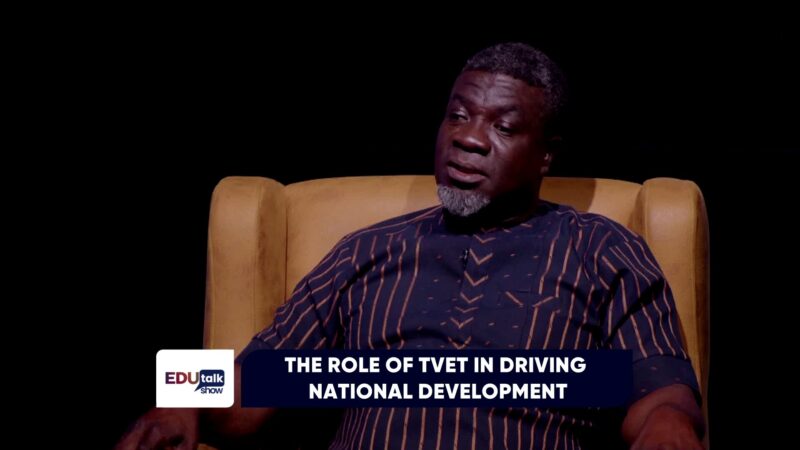The Director-General of the Ghana Technical and Vocational Education and Training (TVET) Service, David Prah, has emphasised the growing importance of industry in the development of curricula.
Speaking on JoyNews’ EduTalk Show with host Emefa Apawu, he highlighted how collaboration with industry has been key to transforming TVET education in Ghana, aligning it more closely with the needs of the labour market and helping to address youth unemployment.
Mr. Prah credited the government's transformation agenda for increasing enrollment in TVET programmes from under 50,000 students before President Akufo-Addo’s administration to nearly 200,000 today.
He attributed this surge in enrollment to the government’s focus on making TVET more relevant to industry needs, which has made vocational education more attractive to Ghana’s youth.

Before the reforms, the TVET Director-General noted, there was a significant disconnect between what TVET institutions were teaching and what industry required.
"The first thing the government did was to look at the general TVET transformation system where we had a mismatch between education and training and industry. Industry demands and then education supplies were directly opposite. So the first thing is to look at that aspect and develop great curriculum that will link the industry and education and training. Where the industry becomes the lead, in curriculum development,” he explained.

This mismatch often resulted in graduates being ill-prepared for the job market, leading to high rates of unemployment among graduates.
To address this, the government made a concerted effort to bring industry to the forefront of curriculum development.
This industry-led approach to education has helped to ensure that students who complete TVET programmes are equipped with the skills that employers are looking for. As a result, the employability of TVET graduates is expected to improve significantly, making vocational education an increasingly attractive option for young people seeking practical skills that lead directly to jobs.
"We believe that industry should play the centre role in the development of the curriculum, and that is what we stand for. Industry determines whatever should be learned in school. So, what we do is partner with industry to develop a curriculum that satisfies their needs," he said.
This means that businesses and industries are directly involved in determining the content of TVET programmes, ensuring that students are trained in the specific skills that are in demand. This collaborative approach not only makes graduates more employable but also helps businesses by providing them with a skilled workforce that is ready to contribute from day one.

The shift toward an industry-driven curriculum has been part of a broader effort by the government to reposition TVET as a viable and desirable option for Ghana’s youth. According to Mr. Prah, many young people are now seeing the value of acquiring practical skills, as opposed to focusing solely on general education, which may not always lead to immediate employment.
The government’s commitment to TVET is reflected in its significant investments in the sector. Under President Akufo-Addo’s administration, TVET has been prioritised as part of the broader national development agenda. The government has invested in upgrading TVET institutions, providing modern equipment, and improving the infrastructure needed to deliver high-quality vocational education.
This investment is part of a wider effort to create a skilled workforce that can support Ghana’s industrialisation agenda. By equipping young people with practical skills, the government aims to reduce youth unemployment, which remains a pressing issue in the country. According to the Ghana Statistical Service, youth unemployment stood at 19.7% in 2022. TVET is seen as a critical tool in addressing this challenge by preparing young people for jobs in sectors such as manufacturing, construction, and technology.
He noted that one of the key achievements of the government’s TVET reforms has been the introduction of competency-based training (CBT). This approach focuses on developing specific skills and competencies that are directly applicable in the workplace. It also involves continuous assessment, allowing students to demonstrate their abilities in real-world scenarios. CBT has been instrumental in ensuring that TVET graduates are ready for the demands of modern industries.
The government’s efforts to reform and promote TVET have had a tangible impact on enrollment. He also revealed that, before the current administration, TVET enrollment was less than 50,000. Today, that number is approaching 200,000, demonstrating the growing appeal of vocational education. He attributed this increase to the government's focus on improving the quality of TVET programmes and aligning them with the needs of industry.
"The first thing we did was to develop a great curriculum that links industry and education. The industry now determines what is needed, and we ensure that is what is being taught. This alignment is why we are seeing more young people choosing TVET," he added.
This shift in perception is significant in a country where vocational education has traditionally been viewed as a second choice compared to academic education. The government’s efforts to raise the profile of TVET and demonstrate its value to both students and employers have been crucial in changing this narrative.
Looking ahead, the Director-General expressed optimism about the future of TVET in Ghana. He believes that continued collaboration with industry and further investments in the sector will help to sustain the momentum that has been built in recent years.
He also highlighted the importance of ongoing efforts to promote TVET as a first-choice option for young people, rather than a fallback for those who are unable to pursue academic education.
"We’re making TVET more attractive because people now see that skills are in demand. It’s not just about going to school; it’s about gaining the skills that will get you employed," the TVET Director-General.
Mr Prah also stressed the need for continued government support and private-sector engagement to ensure that TVET programs remain relevant and responsive to the needs of the economy. He called on industries to continue playing an active role in shaping the future of TVET and ensuring that graduates are equipped with the skills they need to succeed.
Latest Stories
-
Trump picks Pam Bondi as attorney general after Matt Gaetz withdraws
6 mins -
Providing quality seeds to farmers is first step towards achieving food security in Ghana
16 mins -
Give direct access to Global Health Fund – Civil Society calls allocations
3 hours -
Trudeau plays Santa with seasonal tax break
4 hours -
Prince Harry jokes in tattoo sketch for Invictus
4 hours -
Akufo-Addo commissions 200MW plant to boost economic growth
4 hours -
Smallholder farmers to make use of Ghana Commodity Exchange
4 hours -
I want to focus more on my education – Chidimma Adetshina quits pageantry
4 hours -
Priest replaced after Sabrina Carpenter shoots music video in his church
5 hours -
Duct-taped banana artwork sells for $6.2m in NYC
5 hours -
Arrest warrants issued for Netanyahu, Gallant and Hamas commander over alleged war crimes
5 hours -
Actors Jonathan Majors and Meagan Good are engaged
5 hours -
Expired rice saga: A ‘best before date’ can be extended – Food and Agriculture Engineer
5 hours -
Why I rejected Range Rover gift from a man – Tiwa Savage
5 hours -
KNUST Engineering College honours Telecel Ghana CEO at Alumni Excellence Awards
6 hours

